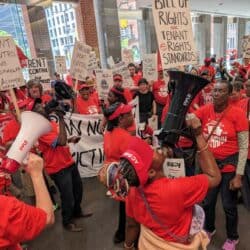Groups that aim to restrict transgender, sex worker, and reproductive rights, among others, are “professionalizing” and wielding increasing influence over humanitarian and social justice spaces.
At a recent meeting with European civil society organizations about human trafficking, Happy Mwende Kinyili was the lone person in the room who wasn’t flat-out against sex work.
Mwende Kinyili had suggested seeking sex workers’ perspectives on how to eradicate trafficking in ways that protect their safety and rights. “Folks were looking at me like, ‘What the hell are you talking about?’” they say.
Mwende Kinyili is the co-executive director of Mama Cash, a Netherlands-based foundation granting to feminist groups globally. They were shocked to see so many seemingly progressive organizations oppose sex work outright. But they say it’s an example of how “anti-gender” groups – groups often associated with the alt-right that oppose the idea of gender as separate from biological sex and that aim to restrict transgender, sex worker, and reproductive rights, among others – are wielding increasing influence over humanitarian and social justice spaces.
A May 2023 paper by the United Nations Research Institute for Social Development calls it “the increasing professionalization that underpins anti-gender advocacy.” The authors write, “There is a growing network of self-styled think tanks funded by anti-gender movements that use mainstream knowledge validation tools, including peer-review articles, policy briefs and webinars, to disseminate anti-gender messages in a range of global development spaces, including the UN system.”
They really do co-opt the language [of human rights organizations].
Happy Mwende Kinyili, Mama Cash
Mwende Kinyili says that instead of the hateful rhetoric often used by other anti-gender groups, “professionalized” anti-gender actors are framing their views with arguments traditionally used by human rights organizations. “They really do co-opt the language,” Mwende Kinyili says, adding that these actors often call their work feminist or social justice–based.
Janet Conway, a professor of sociology at Brock University who researches alt-right movements, says these groups are using rights-based language – and pitting the rights of some against those of others. She points to those who say that including queer and trans issues in school curricula is against parental rights, or those who argue that transgender women’s access to services like women’s shelters violates cisgender (someone whose gender identity corresponds with their assigned sex at birth) women’s rights. One high-profile, Canadian example of the latter is Vancouver Rape Relief and Women’s Shelter. The organization limits some of its services to cis women, arguing that survivors of gendered violence feel less safe “in the presence of a man or someone who has been a man,” and has frequently insinuated, critics say, that its “women only” spaces do not include trans women.
Vancouver Rape Relief has frequently made public statements on its position, faced public backlash, and in 2019 lost its funding from the City of Vancouver. But some foundations say it’s not always that easy to identify an anti-gender group. Beatriz Gonzalez, co-vice-president of programs at Equality Fund, says a government funder once asked Equality Fund how it screens for potential grantee partners’ anti-gender views in its granting processes – because this government body had inadvertently funded an anti-gender group itself.
Foundations’ due diligence process often is financial based, but there’s an opportunity to really include a value screen in that process.
Tania Cheng, Lumiere Consulting
Foundations should take this kind of screening more seriously, says Tania Cheng, principal consultant at Lumiere Consulting, an organization advising foundations, non-profits, and Indigenous organizations on strategy. “The due diligence process often is financial based, but there’s an opportunity to really include a value screen in that process,” Cheng says, “to not just look at financial organizational health [but to] really add some of these criteria and guidelines around equity, inclusion, and intersectionality and provide the resources and the training and the information for whoever’s doing the reviews to come to that process with an intersectional lens.”
Cheng recently worked with the Toronto Foundation on the Fund for Gender Equality, as part of a Government of Canada partnership with 21 community foundations across the country. “We were very conscious,” they say, “in reviewing applications, really reading between the lines to identify whether the organization’s definition of ‘women’ includes trans women, reviewing the language that they’re using and the activities that they’re proposing to get a sense of whether they’re trans-inclusive or whether they’re perpetuating binary gender norms and expectations.” That included setting the review committee up with a glossary of terms to watch for that might signal the presence or absence of anti-gender thinking.
We were very conscious, in reviewing applications [for the Toronto Foundation’s Fund for Gender Equality], really reading between the lines to identify whether the organization’s definition of ‘women’ includes trans women.
Tania Cheng
Conway says “intersectionality” is one of those buzzwords. “[Foundations] need to be tuned in to whether organizations are using the language of intersectionality,” she says, “looking for ways of understanding gender justice . . . that intersect with how women are positioned in terms of race, sexuality, gender identity, disability, Indigeneity, these other axes of social oppression and inequality.” In other words, since anti-genderism rejects the idea that biological sex and gender identity aren’t necessarily connected, it tends to simplify gender equality as ending men’s oppression of women, without taking into account all the other socioeconomic factors complicating that equation. So, if an organization acknowledges intersectionality, that could be a good sign.
The Canadian Women’s Foundation asks about this outright – on application forms. “We ask organizations to explain how they apply feminist intersectional analysis to their work. And if that question gives us any cause for concern, we usually do a follow-up with them,” says Anuradha Dugal, vice-president of community initiatives at the Canadian Women’s Foundation. “There are some organizations that have been very vocally and very clearly anti-trans, so it’s easy to say, ‘Oh, okay, we won’t fund them.’ But it’s more [about] the ones that have not so clearly stood up and said, ‘We are for trans rights’ that we find it harder to understand where they’re at.”
We ask organizations to explain how they apply feminist intersectional analysis to their work. And if that question gives us any cause for concern, we usually do a follow-up with them.
Anuradha Dugal, Canadian Women’s Foundation
Sometimes they seek a second opinion, Dugal says. “We do have a community of committee members who work all across the country who share our analysis, and we do ask them, if we’re ever in doubt, ‘Do you know this organization? What do you think?’”
Equality Fund, similarly, has a global advisory panel of feminist activists who review grant applications and make recommendations on which organizations they should fund. “It’s really important to not make funding decisions in a vacuum,” Gonzalez says. The organization decentralizes its decision-making for many reasons, Gonzalez says, one of them being that it helps their team identify which potential grantees do and don’t share their values. “More eyes on something are more likely to catch something, but it also means that folks with lived experience who are closer to the issues, closer to the debates . . . can say, ‘This should be funded.’” Mwende Kinyili says that Mama Cash’s participatory grantmaking system helps them avoid non-values-aligned potential grantees, too.
It’s really important to not make funding decisions in a vacuum.
Beatriz Gonzalez, Equality Fund
Equality Fund also funnels funding to other women’s funds around the world, and Gonzalez estimates that about a third of the organizations those funds then grant to are receiving philanthropic funding for the very first time. That’s why having activists vouch for these organizations’ reputations is so important, she says. When dealing with more established organizations, the Equality Fund team often asks who their other funders are. “It completes the picture about the organization,” Gonzalez says. “We can see, is it other human rights funders that are funding them?”
This kind of screening process could risk ruling out very new, grassroots organizations, Gonzalez says, but so far that hasn’t been a problem – even brand-new groups are connected in some way or another to a larger movement and have other activists who can vouch for them. “Yes, it’s about the individual work of the organization, but it’s also about collective action,” she says.
Mwende Kinyili says Mama Cash checks in with existing grantees every six months, and during these conversations they evaluate whether the organizations’ positions on inclusivity have changed. In one case, they learned that a group they’d funded had adopted an anti-sex-work position. “It doesn’t mean we then penalize the group. No, we then have a conversation,” Mwende Kinyili says. Mama Cash makes it clear in all communications to potential grantees that to receive funding, they must include in their work the groups often targeted by anti-genderism – and that’s what Mama Cash reminds them: “Remember the thing we told you when you came to apply for funding? If you don’t ascribe to these values, we can’t be in relationship with you.”
In the case of the anti-sex-work group, it was only after a series of conversations over a couple of years that Mama Cash ultimately decided to pull its funding. “We try to work through a lens of trust-based philanthropy, so that’s why it took a while to stop funding that group,” Mwende Kinyili says. The team also seeks to understand where groups are coming from when espousing anti-gender views, they say, recognizing that Mama Cash can always learn more about the complexities of gender-equality work around the world. “[We] need to assume a humble learning posture.”
My freedom is fundamentally tied to your freedom. If sex workers are not free, I cannot be free as a Black, queer person.
Happy Mwende Kinyili
Besides, there’s a reason Mama Cash funded that group in the first place: it was doing important work for gender equity. So why pull funding and cut ties with a group that may not agree on sex workers’ rights but is doing effective work in another area? It’s because when it comes to social justice nothing can be siloed, Mwende Kinyili says. “My freedom is fundamentally tied to your freedom. If sex workers are not free, I cannot be free as a Black, queer person. It’s not possible, because the oppressions that are creating the injustices I live with every day are the same oppressions that create the injustices of a sex worker, of a trans person, and so on and so forth. So we can’t be in partnership with you if there’s a sliver of something [oppressive in your work].”
The first step is starting internally and reflecting on the funder’s policies and practices to assess whether they’re trans-inclusive and truly intersectional.
Tania Cheng
As the anti-gender movement grows stronger, more foundations could find themselves having these difficult conversations with their grantees. It can happen to any organization, Dugal says, and any staff member. “If your shelter or your sex assault centre doesn’t do explicit training to straighten out some of those myths, to do the basic education about trans rights that needs to happen . . . then those front-line workers may be resistant to what it means to be an inclusive service.”
But before a foundation points fingers at an anti-gender grantee, it should make sure its internal culture is inclusive, Cheng says. “There’s a wide range across funders and foundations in their progressiveness around this topic,” they say. “For some foundations, they’re pretty actively thinking about how to be inclusive to trans folks and their communications and their processes. And then I think for some foundations, it’s not really on their radar . . . I think the first step is really starting internally and reflecting on the funder’s policies and practices to assess whether they’re trans-inclusive and truly intersectional.”


